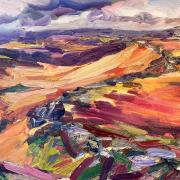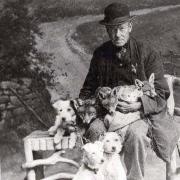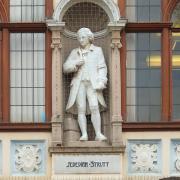Derbyshire Life talks to Sunjeev Sahota, the Derby-born, Man Booker Prize shortlisted author

The story of Derby-born Sunjeev Sahota’s rapid rise to prominence as an acclaimed writer of literary fiction is extraordinary. On the strength of his first novel, Ours are the Streets, published in 2011, he was named in Granta’s once-in-a-decade list of ‘The Best of Young British Novelists’. Each of the previous three Granta lists had foreseen, with remarkable accuracy, the future success of scores of our most celebrated writers. Just two years after the 2013 list appeared, Sunjeev’s second novel, The Year of the Runaways, was included in the shortlist for the most prestigious literary prize of all: the Man Booker Prize.
These prize-winning facts of Sunjeev’s stellar ascent to literary stardom are remarkable enough, but the story of his becoming a writer is even more surprising. Rather than being the recipient of any form of training in creative writing, Sunjeev is a Mathematics graduate who studied at Imperial College, London. In fact, he did not even read a novel until he was 18 years old.
Explaining why he had not picked up a book of fiction before this time, he said, ‘When I took my GCSE in English, I studied Yevtushenko’s poetry and plays by Shakespeare and Oliver Goldsmith, but no novels. The first novel I read was Salmon Rushdie’s Midnight’s Children, which I bought at the airport bookshop when I travelled to India after completing my A-levels.’

Rushdie’s celebrated Booker-winning book had an immediate and profound effect on Sunjeev. He said, ‘It was like a dam bursting and finding myself swimming in the wonderful world of narrative story-telling. Inspired by this book of magic-realism, I read a great many more novels during my time at university, even though I was studying for a degree in Mathematics.’
Sunjeev had spent the early years of his life in the Derby suburb of Normanton, where there is a large immigrant community, including many people who share his family’s background as Sikhs who came over from the Punjab in the 1960s. At the age of seven, Sunjeev moved with his parents and his brother to Chesterfield, where his father had taken over the running of a convenience store after leaving his job as a television engineer in Derby. Chesterfield is a town where there are relatively few people of Asian descent, and Sunjeev recalls being subjected to a good deal of racially-motivated bullying from a much older pupil during his first year at secondary school.
After graduating, Sunjeev obtained a job in Leeds and then moved to York to work for the Aviva insurance company. He said: ‘I realised from newspaper reports that I had been living in Leeds just a few streets away from Mohammad Sidique Khan, one of the 7/7 London suicide bombers. Knowing this was a man who was like me in age and also in being the child of an immigrant family, I wanted to analyse why he had abandoned his family in order to kill himself and so many other people.’
It was this question that prompted Sunjeev to write Ours are the Streets. The novel, written in the first person and without any breaks for chapters, is a fictional account of how Imtiaz, a British Asian, becomes a potential suicide bomber. Asked to explain how he had been able to write a novel so gripping that it is almost impossible to put down once you have started to read it, Sunjeev said: ‘Whenever I read a novel, I try to analyse how the book has been written and how the author has put together the story. I firmly believe that reading is the best way to learn how to write.’

The early chapters of the book relate how Imtiaz marries Becka, his pregnant white girlfriend, who converts to Islam (or ‘reverts’, according to the term used by Muslims) and moves into the family home. Although Imtiaz is reasonably well integrated into British society (he will ‘root for’ Liverpool football club, but he refuses to support the England team), plenty of tension exists between him and his very traditional parents. In the main, these seem to be not dissimilar to the conflicts between most parents and their children, regardless of cultural differences.
However, there is an excruciating and unforgettable episode in the book where Imtiaz cannot bear his father’s silent acceptance of being humiliated in a restaurant by a raucous member of a hen party. Imtiaz’s feelings of anger and shame become even more apparent when his father dies from a heart attack after chasing a passenger who had dodged paying the fare in his taxi cab.
After his father’s death, Imtiaz travels to Pakistan, where he tries to integrate into the life of his ancestral village, but finds that he is regarded, at least initially, as an unwelcome intruder. During his stay, he is taken by a friend to a Jihadi camp in Afghanistan. Although the author does not explain what happens in the camp in any detail, we gather that Imtiaz has become so radicalised by the end of his stay in Pakistan that he returns to England as a potential suicide bomber. In the final chapters of the book, the tension builds almost unbearably as Imtiaz considers whether he will go ahead with a plan to plant a bomb in a large shopping centre.
Sunjeev’s second novel, The Year of the Runaways, studies the lives of three Indian men and a British-Indian woman. Avtar and Randeep both come from middle-class families but Tochi is an ‘untouchable’, from the lowest Indian caste. The three are living with several other migrant workers in a house in Sheffield. Narinder, who lives separately, is Randeep’s ‘visa wife’.
Written in the third person, this ambitious novel almost reads like several books in one, because Sunjeev sets the scene for the lives of the four main characters in England by covering their back-stories in a series of separate chapters. These superbly told and utterly convincing accounts are used to expose the various motives, including economic necessity and the need to escape persecution, that drive so many people to seek a new life in the West.
The families of Avtar and Randeep are heading towards financial ruin, but it is the story of Tochi, the ‘untouchable’, that is particularly heart-breaking because all the members of his family have been brutally killed in a caste-related massacre. Narinder, the heroine of the book, is touchingly portrayed as a deeply religious woman who is motivated by a need to help others, even if it means engaging in deception to do so.
The men quickly realise that life in England does not live up to their expectations. They live in cramped and squalid conditions and they are forever desperately trying to find work, all of it menial and very low paid. As Randeep says, ‘I never thought life in England would be like this.’
Sunjeev uses the last chapter in his long novel to move forward in time. The final scene, in which Narinder catches sight, at a distance, of Tochi, whom she has not seen for many years and for whom she has deep affection, is one that will live in the mind of most readers for a very long time.
After taking the literary world by storm with his first two books, Sunjeev now writes full-time and lives in Sheffield with his wife and two daughters. Having no wish to become immersed in the circuit of celebrity authors, he prefers to ‘be left to work quietly at home’ on his third novel, which is apparently destined to have a touch of magic realism, much like Salman Rushdie’s Midnight’s Children, the novel that first introduced Sunjeev to the world of literary fiction.
Ours are the Streets and The Year of the Runaways are published by Pan Macmillan. The author is speaking at Derby Book Festival on 6th June, 6pm–7pm at QUAD in the Cathedral Quarter. Tickets are £8/£6.



























